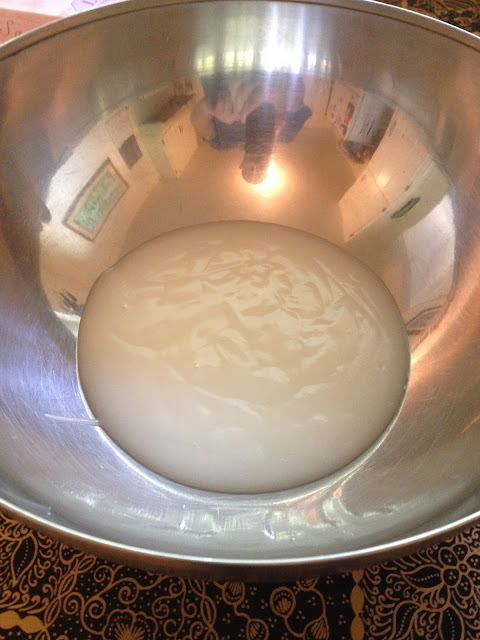In the beginning GOD created the Korea and the Cabbage
The cabbage, although from Napa, was without flavor and void, and darkness was over those who consumed it as much noise and odor would blast forth from their nether regions.
And GOD said "Let there be flavor and nutrients and healthy digestion" and there was flavor and nutrients and healthy digestion.
Yet this flavor, etc., etc., etc., was not from within, but from without, for without the dried chili and fresh veg and fermentation that Korea fused with the cabbage, all would be naught.
And Korea called this fermented cabbage KIMCHI, and it was the best in the world.
The following is not the actual best KIMCHI in the world, it's just a tribute.....
KIMCHI is the national dish of Korea, and for those not all that familiar with it, KIMCHI really just means fermented and pickled. The traditional version is Napa Cabbage, the one I'll show you below, but it can really be made with any green or root vegetable.
In Korea EVERYONE makes their own KIMCHI and it's usually eaten with EVERY meal. And also, in Korea, the preferred method of storing KIMCHI is in a clay pot buried in the ground, lightly covered so that it can vent at will. The smell of KIMCHI is everywhere.
Back me up here Casey!
As mentioned before, it is literally fermented cabbage, essentially rotting. But while it rots millions of tiny, very essential and good for you, bacteria are being created. Bacteria that are critical to the proper functioning of your colon and overall digestive system. You can, and obviously do, get these same bacteria from other things in your diet, but this is a really delicious and awesome way to supplement those.
It all starts with the cabbage, Napa Cabbage
Slice in half, submerge briefly in water, apply course salt between each leaf (primarily at the root end, the thickest part) and then let it sit for 2 hours, then turn over for another 2 hours. The purpose of which is to draw out some of the water within the cabbage.
These are cut and watered
And these have been salted
2 hours have now passed, these have been turned
Shrinkage has begun
In 2 more hours we rinse them 3 times and then rub the paste between each leaf, and then it sits out, un-refrigerated, at least 24 if not 48 hours
The paste begins with these vegetables:
Daikon Radish, Korean Chive, White Onion, Ginger, Scallion, Garlic.
And also a porridge (chill out, I'll explain) and chili flakes and fish sauce
Porridge is sweet rice flour cooked with water and when it becomes thick like pudding sugar is added.
La porridge
This is probably one of the most important ingredients, no, not ingredient but items, components, within this mixture. This is what makes the paste stick to the cabbage. Much like when making a breading for let's say, fried chicken. First you dredge the chicken in flour, then egg (or some liquid) then the breading or crumbs or whatever. It's the dredging in flour that makes the breading stick.
This is that. And it's critical.
Chili Flakes
Fish Sauce
Finely diced Garlic, Onion, Ginger
Scallion
Daikon Radish cut into matchstick sizes
Korean Chive, matchstick
Voila!
4 hours later maximum shrinkage has occurred
Rinsed 3 times and ready for the paste (what did she say?...)
BOOM!
The paste is painstakingly applied between each and every leaf
Lids are lightly secured as there will be MUCH gas and terrible rotting odor emitted. If the lids are tightly secured pressure will continue to build and eventually there will be an explosion, and red rotting cabbage will spew forth. You don't want this.
They will sit out on the counter for 1 to 2 days. Yes, it smells horrid, and will continue to smell this way. As mentioned previously, this is rotting, fermenting cabbage.
Smell = Terrible
Taste = AWESOME
Fini
Sliced and ready to eat
It's important to note here that this will, forever, continue to decompose releasing much gas, every day, all the time. In lieu of a clay pot buried in the ground I opt for a Mason jar in my fridge. Every day the lid must be loosened to release the built up gas. The best method would be to have a large jar to hold ALL of the KIMCHI just made and a small, light weight plate sitting atop so that as gas built up it will simply push to plate up and escape. But alas, I do not have this setup currently so my KIMCHI will be divided between the jars avail and rest gently in the fridge, and I'll say hello to each and everyone of them every day.
This will never go bad. It will continue to ferment and break down, eventually, if left uneaten, becoming simply a spicy liquid at which time it can be made into soup. Mine never gets to this point cause I eat this shit UP!
I love KIMCHI
Thank you Korea!
P.S. The Korean film industry is also a pretty amazing. Some of the best movies I've ever seen are Korean. The writing is fantastic, story lines are creative, original, mind blowing at times. Superb acting.
If you have an interest, these are some of my favorites, not in any particular order:
Castaway on the Moon
Sympathy for Mr. Vengeance
The Yellow Sea
The Host
I hope you've enjoyed my little tribute to the national dish of Korea. There are many versions and varieties of KIMCHI out there so get out there and try some KIMCHI!
DVA






























This comment has been removed by the author.
ReplyDelete